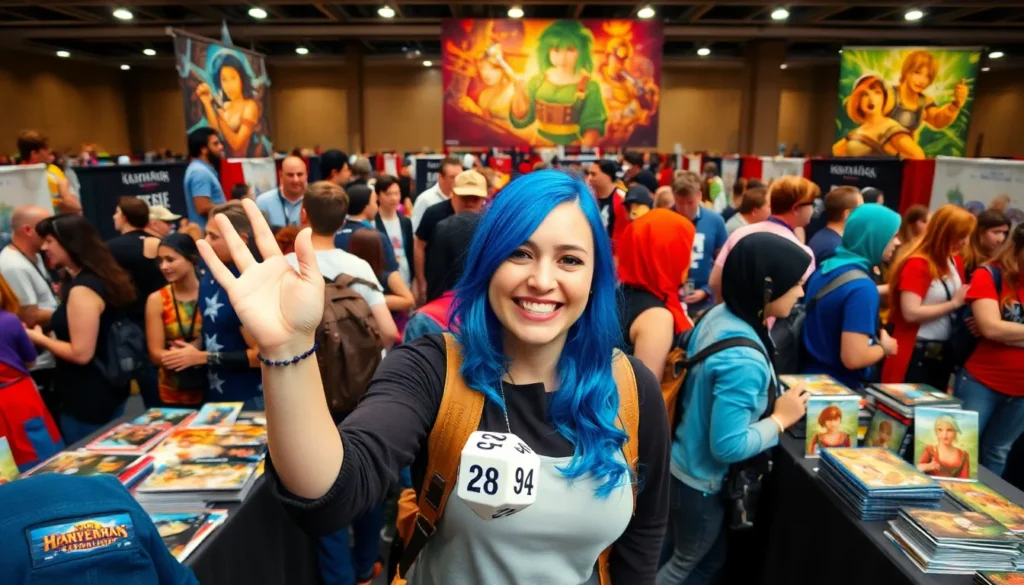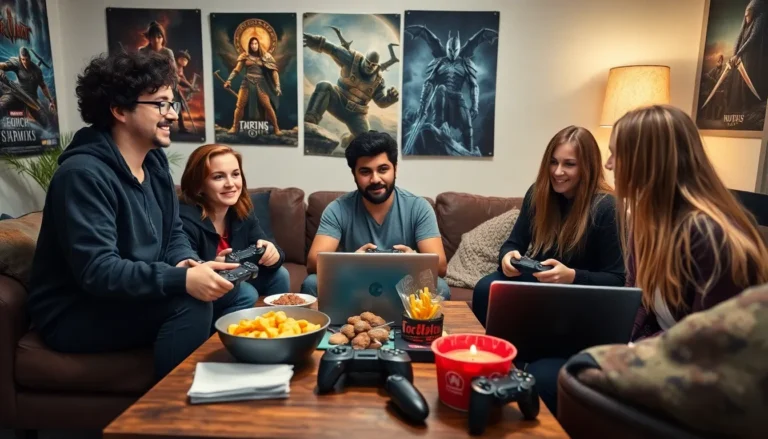Table of Contents
ToggleIn the vibrant world of gaming, RPG fandom stands out as a unique and passionate community. Players immerse themselves in rich narratives, intricate characters, and expansive worlds that spark their imagination. This deep connection often transforms casual gamers into devoted fans, eager to explore every facet of their favorite role-playing games.
From tabletop adventures to sprawling digital landscapes, RPG enthusiasts share their experiences and creativity through fan art, storytelling, and online discussions. This thriving culture fosters friendships and collaborations, creating a sense of belonging that transcends geographical boundaries. As RPGs continue to evolve, so does the fandom, making it an ever-expanding universe of exploration and expression.
Understanding RPG Fandom
RPG fandom embodies a dynamic community centered around immersive storytelling and interactive gameplay. This section explores the origins and growth of RPG fandom over the years.
Origins of RPG Fandom
RPG fandom traces its roots to the 1970s with the introduction of tabletop role-playing games like Dungeons & Dragons. Players engaged in collaborative storytelling, creating rich narratives driven by group imagination. As gaming technology evolved, early computer RPGs inspired dedicated fan bases, expanding the reach of the genre. These foundational elements fostered a community where creativity and shared experiences flourished, laying the groundwork for future RPGs and their dedicated fans.
Growth Over the Years
RPG fandom has experienced significant growth since its inception. In the 1980s and 1990s, the popularity of video games introduced RPG elements into mainstream culture. Iconic titles like Final Fantasy and The Elder Scrolls further fueled interest, attracting diverse audiences. Online platforms emerged in the early 2000s, facilitating fan interaction through forums and social media. Today, RPGs encompass various formats, with live-action role-playing and virtual tabletop systems expanding participation. This evolution continues to cultivate a passionate community that shares creativity and enthusiasm across genres and platforms.
Key Characteristics of RPG Fandom

RPG fandom is characterized by its vibrant community engagement and creativity. These elements foster connections among fans, driving the popularity of role-playing games.
Community Engagement
Community engagement defines RPG fandom through active participation and interaction. Fans engage in various activities, such as online forums, social media groups, and local meet-ups, fostering connections across the globe. They collaborate in campaigns, share character backstories, and provide feedback on game mechanics. Events like conventions and online streams create opportunities for face-to-face interactions. Players often host game nights, forming bonds that deepen their commitment to the community. This shared enthusiasm reinforces the sense of belonging, making fans feel valued and connected.
Creativity and Storytelling
Creativity and storytelling are central to RPG fandom. Players craft narratives that enhance their gameplay experience. Fan art, character sketches, and written stories reflect this creativity and often receive recognition within the community. Players develop unique characters, complete with rich backstories and personal quests, which breathe life into imaginary worlds. Collaborative storytelling expands beyond the game itself, inspiring fan fiction and multimedia projects. This imaginative outlet showcases individual talents and forms a deeper appreciation for the intricacies of the RPG universe, making each player’s contribution vital to the overall narrative tapestry.
Popular RPG Genres
RPGs encompass a variety of genres, each offering unique gameplay mechanics and immersive experiences. Two major categories dominate the RPG landscape: tabletop RPGs and video game RPGs.
Tabletop RPGs
Tabletop RPGs focus on collaborative storytelling, often facilitated by a game master. Players create characters and embark on adventures using dice rolls to determine outcomes. Popular examples include Dungeons & Dragons, Pathfinder, and Call of Cthulhu. These games thrive on player creativity, encouraging character development and complex narratives. Sessions often involve strategic combat, problem-solving, and extensive world-building. The social aspect enhances engagement as players interact face-to-face, fostering lasting friendships and a shared sense of adventure.
Video Game RPGs
Video game RPGs immerse players in digital worlds with expansive narratives and character progression. These games may include turn-based combat or real-time action, appealing to diverse audiences. Renowned franchises like Final Fantasy, The Elder Scrolls, and Mass Effect exemplify the depth of video game RPGs. They feature rich lore, skill trees, and branching storylines, allowing for personalized gameplay. Online multiplayer RPGs, like World of Warcraft and Genshin Impact, further enhance community engagement through cooperative missions and player interactions. As a result, video game RPGs present dynamic environments that captivate players, encouraging exploration and investment in their characters’ journeys.
The Role of Online Communities
Online communities play a crucial role in uniting RPG fans, offering platforms for interaction, creativity, and collaboration. These spaces foster deeper connections and enhance the overall experience of RPG fandom.
Forums and Social Media
Forums and social media platforms serve as vibrant hubs for RPG discussions. Participants exchange gameplay strategies, share character backstories, and post fan art. Popular forums like Reddit and dedicated RPG websites facilitate conversations among enthusiasts, helping players discover new games and ideas. Social media channels, such as Twitter and Facebook, amplify engagement, allowing fans to follow game developers, participate in polls, and join interest-based groups. These platforms enable immediate feedback and interaction, nurturing a sense of community that transcends physical boundaries.
Streaming and Content Creation
Streaming services and content creation platforms significantly contribute to the RPG community. Twitch and YouTube foster environments where players share live gameplay and tutorials, attracting large audiences. Streamers showcase diverse RPG styles, engage with their viewers, and provide insights into character development and narrative techniques. Additionally, the content generated—such as podcasts and fan-made videos—enhances collective creativity. These creators not only entertain but also educate the community, inspiring others to explore RPGs and engage with narratives in innovative ways.
Impact of RPG Fandom on Pop Culture
RPG fandom significantly influences pop culture, shaping various media forms and fostering connections among fans. This influence manifests in multiple avenues, from storytelling in other media to vibrant merchandise and event culture.
Influence on Other Media
RPGs set a narrative standard in film, television, and literature. Numerous TV shows and films draw directly from RPG themes, illustrating layered storytelling and character development. For instance, shows like Stranger Things incorporate tabletop elements, while films like Dungeons & Dragons aim to capture the game’s essence. Video games inspire adaptations, with series such as The Witcher stemming from RPG source materials, bridging audiences from gaming to visual storytelling. Graphic novels and webcomics built on RPG mechanics engage readers, expanding audience reach. This cross-pollination enhances mainstream media, demonstrating how RPGs invigorate creativity and influence narrative structure on broader platforms.
Merchandise and Conventions
Merchandise extends the reach of RPG fandom, covering an array of products. Official games generate collectibles, character figurines, apparel, and themed accessories, catering to fans’ desires for tangible connections to their favorite universes. Meanwhile, conventions celebrate RPG culture, offering gamers chances to engage directly. Events like Gen Con and PAX gather attendees for gaming sessions, panels, and merchandise expos, facilitating community building. These conventions encourage fan engagement and brand partnerships, contributing to the culture’s growth and visibility. Crowdsourced projects such as RPG-themed crowdfunding campaigns garner significant support, further demonstrating the community’s impact on both commerce and creativity.
RPG fandom represents a unique blend of creativity and community that continues to grow and evolve. Players find not just entertainment but also a sense of belonging in this vibrant world. Through shared experiences and collaborative storytelling, they forge connections that transcend geographical boundaries.
As RPGs adapt to new technologies and formats, the passion of their fans fuels ongoing innovation. The rich narratives and characters inspire countless creative expressions, from fan art to immersive online campaigns. This thriving community not only influences gaming culture but also leaves a lasting mark on various forms of media. The future of RPG fandom looks bright, promising even more opportunities for exploration and collaboration among its dedicated members.







